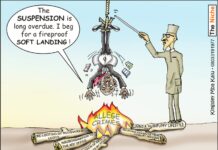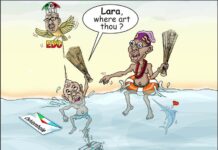Nigerians have reasons to worry about the gale of defections from the Peoples Democratic Party (PDP) to the All Progressives Congress (APC) since the presidential and National Assembly (NASS) elections on March 28.
While the tendency increases even before the May 29 hand-over date, explanations are few. Only snippets from defectors provide insight.
Push rather than pull factors are the main lure. The consequence is that these same factors may one day pull the defectors out of the APC to other victorious parties, including the PDP.
If that happens, it may be good news for the PDP. It does not, however, remove the fact that there could be a fundamental rot in the party pushing its members to seek greener pastures elsewhere.
What is going on is bad for the PDP that has ruled the country for 16 years since soldiers left the political scene in 1999.
To see a party, whose leaders had boasted that they would rule for 60 years, sidelined like a mushroom social club in the federal elections on March 28 was a big surprise.
Curiously, none of the defectors has yet cited ideological incompatibility of the centre-right PDP as reason for moving to the centre-left APC. In other countries, ideology keeps politicians and their supporters in one party for life. That is hardly the case in Nigeria.
The lack of internal democracy, a significant push factor prior to the formation of the APC, is counted among the reasons for the migration.
The imposition of candidates at all levels in the PDP, such as sole presidential candidate, incumbent Goodluck Jonathan, gave PDP governors the cue to impose their own candidates. This sparked outrage among legislators, federal and state.
Before then, however, the exodus had commenced, with the party casually dismissing the trend as no big deal.
The defection of the Speaker of the House of Representatives, Aminu Tambuwal, from the PDP to the APC on October 28 last year sparked an acrimonious nationwide scandal of sorts.
On March 18 this year, former House of Representatives Speaker, Ghali Na’Abba, also left the PDP for the APC and was conferred with automatic membership of its Board of Trustees. His reason for defection was that successive PDP governments had failed Nigerians.
But what really exposed the PDP underbelly was when seven governors and their supporters joined former Vice President, Atiku Abubakar, to walk out of its special national convention in Abuja on August 31, 2013 to form the New PDP.
The PDP scoffed. Its National Publicity Secretary, Olisa Metuh, said: “It’s only a matter of time before men who are disloyal to their mothers would become disloyal to their step-mothers.” Atiku and five of the governors got the message and later crossed over to the APC.
The trend continued up till last week, when Olusola Oke, former PDP National Legal Adviser, shocked all when he led several others to defect to the APC, and even confessed that he worked with the others to ensure the defeat of the PDP on March 28.
Others who defected from the PDP to the APC in the past two weeks include former Deputy Senate Majority Leader, Jonathan Zwingina; former External Affairs Minister, Idi Hong; Senator Gbemisola Saraki; and former Edo State Governor, Oserheimen Osunbor.
It is unclear what the mass defections mean for the stability, structural and organisational coherence and efficiency of the APC.
Whether it can govern well and maintain cohesion – being a party formed in a hurry and is now a magnet for aggrieved politicians from all parties – is a moot point.
APC National Chairman, John Odigie-Oyegun, has warned the political turncoats not to expect a rosy accommodation.
The Constitution guarantees freedom of association. But for an office holder to retain his seat after defecting from a party through which he was elected is a moral burden.
This is against the backdrop of the constitutional demand that legislators defecting to other parties lose their seats unless on the grounds of conflict in their parties.
There is, therefore, the need to implement the law that requires defectors to quit their legislative seats. It should also apply to elected office holders in the executive arm of government.
That would halt the unprincipled tendency of elected officials to jump out of their political parties at the slightest instance. It would also reduce conflict in the parties and facilitate politics driven by ideology.













